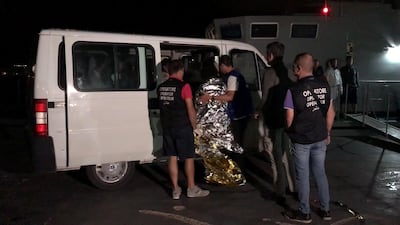At least 13 people died on Monday when an overloaded migrant boat capsized near the Italian island of Lampedusa, renewing calls to shut down smuggler routes and improve rescue efforts in the Mediterranean Sea.
The Italian coastguard said one of its vessels was ready to rescue the migrants about six nautical miles off Italy’s southern-most island when the boat overturned.
Survivors told the UN refugee agency that the migrants all moved to one side of their unseaworthy vessel when they saw the rescue ship.
Twenty-two people were plucked from the sea and taken to safety but 13 women were pulled dead from the water.
The search was continuing for 15 missing, including an unknown number of children. The boat left Tunisia with mostly west Africans and Tunisians.
The incident brings to more than 1,000 the number of people who have died in the Mediterranean Sea this year.
“Enough massacres in the sea,” Lampedusa Mayor Toto Martello said.
“We cannot continue to watch bodies being unloaded of poor people who are following a dream to better their lives. Politicians must react.”
The tragedy comes six years after the October 3, 2013 disaster that killed more than 360 people and prompted Italy to increase its patrols of the deadly crossing from Libya.
Europe launched a military operation to stop smugglers after hundreds more died in Libyan migrant shipwrecks in April 2015.
But that operation, called Sophia, is now limited to aerial searches to identify smugglers’ boats in need of rescue.
Humanitarian groups say that often is not enough.
The UN refugee agency said that Monday’s incident “highlights once again that urgent action is needed to address the situation on the Mediterranean".
It called for the EU to resume its search and rescue operations, especially along the dangerous route from Libya.
UN spokesman Charlie Yaxley in Geneva said the agency was calling for “greater efforts to tackle the smugglers who prey on people. At the moment they are able to act with impunity".
The International Organisation for Migrants said that 688 have died along that route so far this year, compared with 1,261 in the same period last year.
The total deaths at sea in the Mediterranean hit 1,071 until Monday, fewer than 1,890 by the same date in 2018.
Patrolling the Mediterranean has largely been left to humanitarian rescue ships but there are fewer of those than a year ago because of sanctions introduced by Matteo Salvini when he was Italian interior minister.
And once a rescue has been carried out, Italy and Malta have closed their ports to the charity ships, leading to days or weeks of haggling with the EU to find a safe harbour.
One of those charities, Spain's Open Arms, said on Monday it rescued 44 people, including a small boy and a months-old baby, on a wooden boat trying to reach Europea.
Gerard Canals, chief of mission of the Open Arms rescue boat, said the boat was found late on Sunday in Malta’s rescue zone, about 50 nautical miles from Lampedusa.
Mr Canals said that Malta’s rescue co-ordination centre told the group not to offer any assistance, as Italy would probably send a patrol boat from Lampedusa, about an hour away.
But after waiting for five hours, Open Arms decided to rescue them anyway because the boat would not have made it to land without fuel, and bad weather was approaching.
Rescued were 38 men, four women, a boy aged four, and a baby about 6 months old. They were all in good condition.
“The surprise was to hear Malta’s instructions,” Open Arms founder Oscar Camps said in Barcelona.
"We are evidently talking about a vessel in distress, an overcrowded boat without any type of guarantee that it can reach anywhere, and evidently without enough fuel to reach the island of Lampedusa."
The Maltese government declined to comment.
Mr Camps said that had the Open Arms been cleared to rescue the 44 earlier, instead of waiting five hours, the ship could have sailed to Lampedusa and helped in that rescue, perhaps saving lives.
But he said the fact that they were not called was an indication of authorities’ reluctance to co-ordinate with them.
“Once again we denounce that these boats are in distress," Mr Camps said.
"They are by themselves, vessels in danger, because of the dimensions, the overweight and the lack of navigation capacity and few security guarantees they can offer.
“They must be intervened with immediately. They cannot be left to their own luck.”

